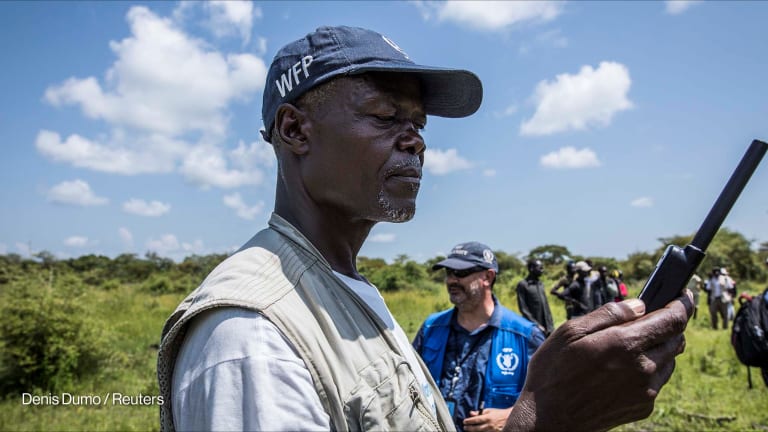
We live in compelling times. We are witnessing the migration of people on an unprecedented scale, reflecting the challenges of the changing polemic profile of the world. Indeed there are fewer conflicts in the world, but our current conflicts have more regional and international significance. The conflict in Syria, for example, is affecting the geopolitical balance of power in the region and far beyond.
The magnitude of loss and displacement calls for more global responsibility. On World Refugee Day in 2014, the U.N. refugee agency reported that the number of refugees, asylum-seekers and internally displaced people worldwide had exceeded 50 million people for the first time since World War II. Since 2014, worldwide displacement has hit an all-time high, approaching 60 million.
Europe has faced large refugee movements before — for example, during both world wars and more recently during the Bosnia and Kosovo Wars in the 1990s. However, for the first time in its history, Europe is facing a mass influx of refugees from outside the region. The war in Syria — as well as conflicts in Afghanistan and Iraq — are among the major causes of the recent upsurge in the numbers of forcibly displaced people. To stem the flow, U.N. member states need to address the U.N.’s primary aim of saving succeeding generations from the scourge of war and reaffirming faith in fundamental human rights.
At the same time, however, we must also respond to the immediate human security and long-term needs of displaced people, promoting social progress and better standards of life in larger freedom.
#AcrossBorders and the future: From destination to integration
Governments and nongovernmental organizations alike are grappling with how to tackle long-term issues of the sustainable integration of refugees. In this #AcrossBorders Week Four feature, Devex spoke to a number of organizations to learn about their biggest challenges and best practices in ensuring a smooth integration of refugees at their destination.
Where to stop and end the migration journey becomes an issue when large numbers of refugees cross borders. Refugees — our fellow people, parents and children — are more likely to stop and settle where they feel safe and welcomed and where they see opportunity for a life in dignity and prosperity.
More than half of the world’s refugees are currently in urban environments, not in camps. There is a refugee registration center opposite my home here in Bonn, Germany. I can't even begin to imagine what it has meant to leave lives and hopes and look to this new, foreign country to create space for new dreams and build new realities.
In his Huffington Post article, Alexander Betts, director of the University of Oxford’s Refugee Studies Centre, suggests that creative policies are needed that “rethink the nature of protection and assistance. These will include recognizing the capacities, rather than just the vulnerabilities, of refugees. To be sustainable, we will need to help people to help themselves, integrate them into the global economy, and empower them to make an economic contribution.”
Volunteers already play an essential role in humanitarian action as first responders. They are the first on the ground and bring energy and motivation with them. Volunteerism is a powerful force that engages people in tackling development challenges.
In the scheme of human migration and displacement, women and girls comprise about half of any refugee, internally displaced or stateless population. In situations of displacement, when discrimination and sexual and gender-based violence can be exacerbated, women and girls are at risk. Supporting access to rights for women and children migrants is high on our agenda, as are sensitization and protection.
U.N. Volunteers work to promote gender equality and ensure equal access to protection and assistance. National U.N. volunteer Jean-Paul Dargal Bitobo — a gender-based violence specialist with U.N. Women in Cameroon — organizes and facilitates information meetings for women. U.N. volunteers inform these women of their human rights and raise awareness on gender-based violence.
With so much already taken from them, asylum-seekers crave to be valued for their talents and skills. Doing so may be the key to smoothly integrating the great flows of forcibly displaced persons into recipient countries. Through their skills and capacities — and their own refugee experience — refugees who volunteer are able to design and implement measures that address numerous deficits — for example, in protection and basic social services.
An innovative UNV endeavor is currently underway in Lebanon, where 102 Palestinian refugees, all long-time legal residents of Lebanon, have been mobilized as national U.N. volunteers to teach Palestinian schoolchildren newly arrived as refugees from Syria. In this project — conducted together with the U.N. Relief and Works Agency and the European Union — the national UNV teachers are deployed to schools for Palestinian refugees located throughout Lebanon, including the Burj al Barajne camp in Beirut.
European countries should consider following Lebanon’s example in this regard and mobilize volunteer refugees. This would empower and give dignity and purpose to people who are looking to integrate.
The ways regular people can help out in times of humanitarian crisis are endless. You don't need much to help; you just need to dedicate time and effort. We've seen Munich train station flooded with volunteers ready to welcome refugees with open arms. That's the first step toward helping migrants integrate and feel like they can find a place. And for the refugees, while it may be difficult to find employment, volunteering can help them feel they belong and instil a sense of stability and pride.
Across Borders is a monthlong online conversation hosted by Devex and partners — World Vision, the European Commission's Humanitarian Aid and Civil Protection department, the U.S. nonprofit partner of the International Organization for Migration and United Nations Volunteers — to analyze and amplify the discussion on global migration and current refugee crises through the lens of global security, development cooperation and humanitarian aid work, and more. Visit the campaign site and join the conversation on social media tagging @devex and #AcrossBorders.








